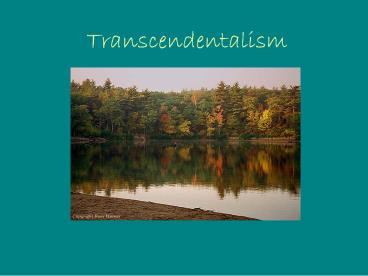Transcendentalism - PowerPoint PPT Presentation
1 / 23
Title: Transcendentalism
1
Transcendentalism
2
What does transcendentalism mean?
- There is an ideal spiritual state which
transcends the physical and empirical. - A loose collection of eclectic ideas about
literature, philosophy, religion, social reform,
and the general state of American culture. - Transcendentalism had different meanings for each
person involved in the movement.
3
Basic idea thanks to Wikipedia
- Transcendentalism was a religious and
philosophical movement that was developed during
the late 1820s and 1830s1 in the Eastern region
of the United States as a protest against the
general state of culture and society, and in
particular, the state of intellectualism at
Harvard University and the doctrine of the
Unitarian church taught at Harvard Divinity
School. Among the transcendentalists' core
beliefs was the inherent goodness of both people
and nature.
4
- Among the transcendentalists' core beliefs was
the inherent goodness of both people and nature. - Transcendentalists believed that society and its
institutionsparticularly organized religion and
political partiesultimately corrupted the purity
of the individual. They had faith that people are
at their best when truly "self-reliant" and
independent. It is only from such real
individuals that true community could be formed.
5
Where did it come from?
- Ralph Waldo Emerson gave German philosopher
Immanuel Kant credit for popularizing the term
transcendentalism. - It began as a reform movement in the Unitarian
church. - It is not a religionmore accurately, it is a
philosophy or form of spirituality. - It centered around Boston and Concord, MA. in the
mid-1800s. - Emerson first expressed his philosophy of
transcendentalism in his essay Nature.
6
A Transcendentalist view of the world know
this- txt p. 212
- Everything in the world, including human beings,
is a reflection of the Divine Soul - The physical fact of the natural world are a
doorway to the spiritual or ideal world. - People can use their intuition to behold Gods
spirit revealed in nature or in their souls - Self reliance and individualism must outweigh
external authority and blind conformity
7
More Transcendental ideas
- Spontaneous feelings and intuition are superior
to deliberate intellectualism and rationality
8
What did Transcendentalists believe?
- The intuitive faculty, instead of the rational
or sensical, became the means for a conscious
union of the individual psyche (known in Sanskrit
as Atman) with the world psyche also known as the
Oversoul, life-force, prime mover and God (known
in Sanskrit as Brahma).
9
Basic Premise 1
- An individual is the spiritual center of
the universe, and in an individual can be found
the clue to nature, history and, ultimately, the
cosmos itself. It is not a rejection of the
existence of God, but a preference to explain an
individual and the world in terms of an
individual.
10
Basic Premise 2
- The structure of the universe literally
duplicates the structure of the individual
selfall knowledge, therefore, begins with
self-knowledge. This is similar to Aristotle's
dictum "know thyself."
11
Basic Premise 3
- Transcendentalists accepted the concept of
nature as a living mystery, full of signs nature
is symbolic.
12
Basic Premise 4
- The belief that individual virtue and
happiness depend upon self-realizationthis
depends upon the reconciliation of two universal
psychological tendencies - The desire to embrace the whole worldto know and
become one with the world. - The desire to withdraw, remain unique and
separatean egotistical existence.
13
Who were the Transcendentalists?
- Ralph Waldo Emerson
- Henry David Thoreau
- Amos Bronson Alcott
- Margaret Fuller
- Ellery Channing
14
Ralph Waldo Emerson
- 1803-1882
- Unitarian minister
- Poet and essayist
- Founded the Transcendental Club
- Popular lecturer
- Banned from Harvard for 40 years following his
Divinity School address - Supporter of abolitionism
15
Ralph Waldo Emerson
Emersons sense of optimism and hope appealed to
audiences who lived in a period of economic
downturn, regional strife, and conflict over
slavery. Your condition today Emerson seemed to
tell his readers and listeners, may seem dull and
disheartening, but It need not be. If you
discover God within you, he suggested, your lives
will partake Of the grandeur of the universe
16
Read Emersons bio p. 216-217
What kind of identity did Emerson see in himself?
Why? Why was he a rebel from what his family
expected of him? How did his message appeal to
young people? What lessened his optimism at the
end of his life?
17
Henry David Thoreau
- 1817-1862
- Schoolteacher, essayist, poet
- Most famous for Walden and Civil Disobedience
- Influenced environmental movement
- Supporter of abolitionism
18
Read bio of Thoreau p. 230-231
Why do you think he was misunderstood by a
majority of people? What was the purpose of his
going to Walden Pond? What was Thoreau
protesting? What modern reformers did Thoreau
influence?
19
(No Transcript)
20
Amos Bronson Alcott
- 1799-1888
- Teacher and writer
- Founder of Temple School and Fruitlands
- Introduced art, music, P.E., nature study, and
field trips banished corporal punishment - Father of novelist Louisa May Alcott
21
Margaret Fuller
- 1810-1850
- Journalist, critic, womens rights activist
- First editor of The Dial, a transcendental
journal - First female journalist to work on a major
newspaperThe New York Tribune - Taught at Alcotts Temple School
22
Ellery Channing
- 1818-1901
- Poet and especially close friend of Thoreau
- Published the first biography of Thoreau in
1873Thoreau, The Poet-Naturalist
23
Resources
- American Transcendental Web http//www.vcu.edu/en
gweb/transcendentalism/index.html - American Transcendentalism http//www.wsu.edu/ca
mpbelld/amlit/amtrans.htm - PAL Chapter Four http//www.csustan.edu/english/r
euben/pal/chap4/4intro.html































